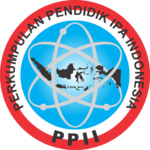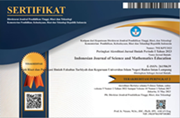Examining the self-regulated learning scale using the Rasch model approach
Abstract
Keywords
Full Text:
PDFReferences
B. J. Zimmerman, “A social cognitive view of self-regulated academic learning,” J. Educ. Psychol., vol. 81, no. 3, pp. 329-339, 1989, doi: 10.1037//0022-0663.81.3.329
B. J. Zimmerman, “Self-regulated learning and academic achievement: An overview,” Educ. Psychol., vol. 25, no. 1, pp. 3–17, 1990, doi: 10.1207/s15326985ep2501_2
E. A. Locke, “Self-efficacy: The exercise of control,” Pers. Psychol., vol. 50, no. 3, pp. 801-804, 1997.
S. Abbasnasab, M. R. Mohd Saad, and R. Boroomand, “Self-Regulated Learning Strategies (SRLS) and academic achievement in pre-university EFL learners,” Calif. Linguist. Notes, vol. 37, no. 1, pp. 1–35, 2012.
B. Bai, J. Wang, and Y. Nie, “Self-efficacy, task values and growth mindset: What has the most predictive power for primary school students’ self-regulated learning in english writing and writing competence in an asian confucian cultural context?,” Cambridge J. Educ., vol. 51, no. 1, pp. 65–84, 2021, doi: 10.1080/0305764X.2020.1778639
D. H. Schunk and B. J. Zimmerman, “Self-regulation in education: Retrospect and prospect,” in Self-regulation of learning and performance, Routledge, 2023, pp. 305–314, doi: 10.4324/9780203763353-13
B. J. Zimmerman, “Attaining self-regulation: A social cognitive perspective,” in Self-regulation: Theory, research, and applications/Academic, 2000, ch. 2, pp. 13–39. doi: 10.1016/B978-012109890-2/50031-7
D. L. Butler, “Qualitative approaches to investigating self-regulated learning: Contributions and challenges,” in Using Qualitative Methods To Enrich Understandings of Self-regulated Learning, Routledge, 2023, pp. 59–63, doi : 10.4324/9781410608529-7
B. J. Zimmerman, “Dimensions of academic self-regulation: A conceptual framework for education,” in Self-regulation of learning and performance, Routledge, 2023, pp. 3–21, doi: 10.4324/9780203763353-1
B. J. Zimmerman, D. Greenberg, and C. E. Weinstein, “Self-regulating academic study time: A strategy approach,” in Self-regulation of learning and performance, Routledge, 2023, pp. 181–199, doi ; 10.4324/9780203763353-8
N. L. Adam, F. B. Alzahri, S. C. Soh, N. A. Bakar, and N. A. M. Kamal, “Self-regulated learning and online learning: A systematic review,” in Advances in Visual Informatics: 5th International Visual Informatics Conference, IVIC 2017, Bangi, Malaysia, November 28–30, 2017, Proceedings 5, 2017, pp. 143–154, doi : 10.1007/978-3-319-70010-6_14
M. Raković et al., “Examining the critical role of evaluation and adaptation in self-regulated learning,” Contemp. Educ. Psychol., vol. 68, no. 1, pp. 1-14, 2022, doi: 10.1016/j.cedpsych.2021.102027
F. Gabriel, S. Buckley, and A. Barthakur, “The impact of mathematics anxiety on self-regulated learning and mathematical literacy,” Aust. J. Educ., vol. 64, no. 3, pp. 227–242, 2020, doi: 10.1177/0004944120947881
C. Schuster, F. Stebner, D. Leutner, and J. Wirth, “Transfer of metacognitive skills in self-regulated learning: An experimental training study,” Metacognition Learn., vol. 15, no. 3, pp. 455–477, 2020, doi: 10.1007/s11409-020-09237-5
A. Pandey, D. Hale, S. Das, A.-L. Goddings, S.-J. Blakemore, and R. M. Viner, “Effectiveness of universal self-regulation–based interventions in children and adolescents: A systematic review and meta-analysis,” JAMA Pediatr., vol. 172, no. 6, pp. 566–575, 2018, doi : 10.1001/jamapediatrics.2018.0232
D. A. Robson, M. S. Allen, and S. J. Howard, “Self-regulation in childhood as a predictor of future outcomes: A meta-analytic review,” Psychol. Bull., vol. 146, no. 4, pp. 1-91, 2020, doi: 10.1037/bul0000227
I. W. A. Parantika and I. G. Astawan, “Pengembangan instrumen self regulated learning dan kecerdasan emosional pada pembelajaran matematika kelas V sekolah dasar,” PENDASI J. Pendidik. Dasar Indones., vol. 6, no. 2, pp. 133–140, 2022, doi: 10.23887/jurnal_pendas.v6i2.1357
M. Lee, “Development the measurement instrument of online self-regulated learning in higher education,” J. Educ. Technol., vol. 34, no. 4, pp. 901–927, 2018, doi: 10.17232/KSET.34.4.901
S. W. Chan, Z. Ismail, and B. Sumintono, “A Rasch model analysis on secondary students’ statistical reasoning ability in descriptive statistics,” Procedia-Social Behav. Sci., vol. 129, no. 12, pp. 133–139, 2014, doi: 10.1016/j.sbspro.2014.03.658
J. Fan and T. Bond, “Applying Rasch measurement in language assessment: Unidimensionality and local independence,” in Quantitative Data Analysis for Language Assessment Volume I, Routledge, 2019, pp. 83–102, doi : 10.4324/9781315187815-5
B. Sumintono and W. Widhiarso, Aplikasi model Rasch untuk penelitian ilmu-ilmu sosial (edisi revisi). Jawa Barat: Trim Komunikata Publishing House, 2014.
B. Sumintono and W. Widhiarso, Aplikasi pemodelan Rasch pada assessment pendidikan. Jawa Barat: Trim komunikata, 2015.
T. G. Bond and C. M. Fox, Applying the Rasch model: Fundamental measurement in the human sciences. London: Psychology Press, 2013.
O. Huei, R. Rus, and A. Kamis, “Construct validity and reliability in content knowledge of design and technology subject: A Rasch measurement model approaches for pilot study,” Int J Acad Res Bus Soc Sci, vol. 10, no. 3, pp. 497–511, 2020, doi : 10.6007/IJARBSS/v10-i3/7066
E. B. Tunç, “Assessing the psychometric properties of the brief resilience scale: A Rasch modeling approach,” Int. J. Eurasian Educ. Cult., vol. 8, no. 23, pp. 2116-2137, 2023.
S. Yasin, M. F. M. Yunus, and I. Ismail, “The use of Rasch measurement model for validity and reliability,” J. Couns. Educ. Technol., vol. 1, no. 2, pp. 22–27, 2018.
W. J. Boone, “Rasch analysis for instrument development: Why, when, and how?,” CBE—Life Sci. Educ., vol. 15, no. 4, pp. 1-7, 2016, doi: 10.1187/cbe.16-04-0148
M. Lee, S. Y. Lee, J. E. Kim, and H. J. Lee, “Domain-specific self-regulated learning interventions for elementary school students,” Learn. Instr., vol. 88, pp. 1-18, 2023, doi: 10.1016/j.learninstruc.2023.101810
M. Theobald, “Self-regulated learning training programs enhance university students’ academic performance, self-regulated learning strategies, and motivation: A meta-analysis,” Contemp. Educ. Psychol., vol. 66, no. 1, pp. 1-84, 2021, doi: 10.1016/j.cedpsych.2021.101976
S.-H. Jin, K. Im, M. Yoo, I. Roll, and K. Seo, “Supporting students’ self-regulated learning in online learning using artificial intelligence applications,” Int. J. Educ. Technol. High. Educ., vol. 20, no. 1, pp. 1-21, 2023, doi: 10.1186/s41239-023-00406-5
R. A. Carter Jr, M. Rice, S. Yang, and H. A. Jackson, “Self-regulated learning in online learning environments: Strategies for remote learning,” Inf. Learn. Sci., vol. 121, no. 5, pp. 321–329, 2020, doi: 10.1108/ILS-04-2020-0114
L. Prieto, J. Alonso, and R. Lamarca, “Classical test theory versus rasch analysis for quality of life questionnaire reduction,” Health Qual. Life Outcomes, vol. 1, no. 1, pp. 1–13, 2003, doi: 10.1186/1477-7525-1-27
C. A. Wolters and A. C. Brady, “College students’ time management: A self-regulated learning perspective,” Educ. Psychol. Rev., vol. 33, no. 4, pp. 1319–1351, 2021, doi: 10.1007/s10648-020-09519-z, doi: 10.1007/s10648-020-09519-z
M. Credé and L. A. Phillips, “A meta-analytic review of the motivated strategies for learning questionnaire,” Learn. Individ. Differ., vol. 21, no. 4, pp. 337–346, 2011, doi: 10.1016/j.lindif.2011.03.002, doi: 10.1016/j.lindif.2011.03.002
DOI: http://dx.doi.org/10.24042/ijsme.v7i3.21831
Refbacks
- There are currently no refbacks.
Copyright (c) 2024 Unit Riset dan Publikasi Ilmiah FTK UIN Raden Intan Lampung

This work is licensed under a Creative Commons Attribution-ShareAlike 4.0 International License.

Indonesian Journal of Science and Mathematics Education is licensed under a Creative Commons Attribution-ShareAlike 4.0 International License.




